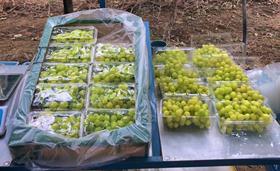
The earliest table grapes in Southern Africa were harvested this week in the Aussenkehr region of Southern Namibia, grapes that will be on the market in major South African centres from this weekend.
The man who, by all accounts, started the table grape business in southern Namibia has, along with his family, now added a new dimension to the Southern African table grape season.
These new vineyards deliver their grapes ten days to two weeks earlier than the rest of the Aussenkehr Valley – and much earlier than South Africa's early production.
The colourful Dusan Vasiljevic, born in the former Yugoslavia, bought Aussenkehr, a failed vegetable farm alongside the Orange River, in 1988.
Over time the Valley rapidly expanded and table grapes became a major export crop. The area became known as ‘grape valley’ or simply, in the international arena, as Aussenkehr.
It is a desert region where it hardly ever rains and the water of the mighty Orange River, which forms the border between South Africa and Namibia, provides the lifeline for the sea of vines growing there.
In these dry conditions table grapes thrive and the influence of pest and diseases are very limited – in short, a very healthy environment to grow table grapes.
The Vasiljevic family decided in 2013 to develop new vineyards on the northern side of the Valley, in the direction of the desert resort of Ais-Ais, but still close enough to harvest utilising the waters of the Orange River.
“Solar Grapes is a family-run table grape development in Aussenkehr,” explained Tanja Vasiljevic. “It was established in 2013 by the Vasiljevic family with a planting of 70ha of grapes, downstream, near the northern-most point of the valley, right next to the iconic Aussenkehr sand dune.
“Over the past two years we have noticed that Horse Shoe Valley has proven to be earlier than the rest of Aussenkehr, so far ten days to two weeks earlier,' Vasiljevic continued. 'Last year we started harvesting on 17 October and this year we start on 27 October. We believe this could be a result of the area being in a microclimate, with warmer winds coming through the Horse Shoe Valley from the desert and long days of sunshine. We called it ‘Horse Shoe’ because of its uncanny resemblance to a horse shoe.”
“We are excited about the prospect of developing more vineyards in this Horse Shoe Valley in the future, thereby capitalising even more on this early window opportunity,” she noted.
A further 130ha were developed in 2017, bring the total area of production at Solar Grapes to 200ha.
Initially the company marketed most of its grapes in the European Union. “However, we have started developing sales in South Africa and are looking to expand further here to take advantage of being the first producers in Southern Africa,' Vasiljevic explained. 'The same goes for the UK market, we are looking to expand our footprint there as well.”
Namibia is lesser-known when compared with other grape growing regions, she adds, and when marketing Solar Grapes, the company has found that people are not aware of the level of quality that comes out of Aussenkehr.
'As a region we have to work to continue to market Namibia and put us on the map and top of mind in leading export markets,' she said.
Trialling new cultivars is a lengthy process and time consuming, yet rewarding when done right,' Vasiljevic continued.
'While we haven’t had experience with other breeder varieties yet, we believe the Arra varieties have proven to be successful for Solar Grapes.”
Solar Grapes is one of the Namibian companies packing its entire crop in the field. “We originally observed this at the Breeder Field Days in California and saw how successful it was. So we brought that process back to Namibia, trialled it in 2017, and found it to be hugely effective in Aussenkehr too.”
Workers pack quicker in the field, hence shortening the coldstorage chain, with the cost to the company lower because there is no packhouse cost associated.
'In addition, we believe it also empowers workers to take more responsibility for their work,” she added.



